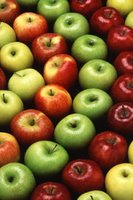 Newswise — For those who think that picking and eating apples this time of year is just for fun and for the great taste of America’s favorite fruit, you may want to think again. Apples and apple juice may be among the best foods that anyone could add to their diet, finds a collection of recent research studies, the latest of which was presented today at the Society of Neuroscience annual conference in Atlanta. Researchers G. Bureau and M. Martinoli from the University of Quebec a Trois-Rivieres, found that quercetin (one of the antioxidants found abundantly in apples) was one of two compounds that helped to reduce cellular death that is caused by oxidation and inflammation of neurons. An abstract of their presentation can be found at http://tinyurl.com/wdu4h.
Newswise — For those who think that picking and eating apples this time of year is just for fun and for the great taste of America’s favorite fruit, you may want to think again. Apples and apple juice may be among the best foods that anyone could add to their diet, finds a collection of recent research studies, the latest of which was presented today at the Society of Neuroscience annual conference in Atlanta. Researchers G. Bureau and M. Martinoli from the University of Quebec a Trois-Rivieres, found that quercetin (one of the antioxidants found abundantly in apples) was one of two compounds that helped to reduce cellular death that is caused by oxidation and inflammation of neurons. An abstract of their presentation can be found at http://tinyurl.com/wdu4h.This finding was previously confirmed not just by testing quercetin by itself, but by using apples as a whole food. Published in the May 2006 issue of Experimental Biology and Medicine, researcher Eric Gershwin, M.D., with the University of California, Davis Health System, discovered a way in which flavonoid-rich apples and apple juice protect cells from damage. Gershwin exposed human cells to an extract of apple mash made from different apple varieties, similar to outcomes presented today at the Society of Neuroscience meeting. The UC Davis researchers then challenged these cells by exposing them to tumor necrosis factor (TNF), a protein-like compound found in the body that usually triggers cell death and promotes inflammation via a mechanism called the “nuclear factor kappa B pathway” (this pathway involves chemical signaling between cells). The UC Davis research revealed that apple extract protected the cells from the normally lethal effects of TNF by interfering with this pathway that would otherwise damage or kill cells in the body. Gershwin noted that the method by which apple extract protects cells is different than that reported for other flavonoid-rich foods.
Other more recent research demonstrated how apples and apple juice can help boost neurological health, specifically in the brain. The latest study from the University of Massachusetts Lowell (UML), published in the August 2006 Journal of Alzheimer’s Disease, indicates that apple juice consumption may actually increase the production in the brain of the essential neurotransmitter acetylcholine, resulting in improved memory among mice who have Alzheimer’s-like symptoms.
Neurotransmitters such as acetylcholine are chemicals released from nerve cells that transmit messages to other nerve cells. Such communication between nerve cells is vital for overall good health, not just in the brain. In addition to finding the improved levels of acetylcholine in their brains, “it was surprising how the animals on the apple-enhanced diets actually did a superior job on the maze tests than those not on the apple-supplemented diet,” remarks Dr. Thomas Shea, who led the research.
Shea, who is the director of the UML Center for Cellular Neurobiology and Neurodegeneration, published yet another study in the December 2005 Journal of Alzheimer’s Disease in which older mice (not mice with Alzheimer’s like conditions) performed significantly better on memory tests than did animals whose diet was not enriched with apple products. Both of these studies, along with similar study published by Shea in the February 2004 issue of Journal of Nutrition, Health and Aging strongly suggests that apples must possess a unique mix of antioxidants that improve cognition and memory via inhibition of oxidation in the brain.
Both the UC Davis and UML studies were funded by unrestricted grants provided by the U.S. Apple Association and Apple Products Research and Education Council.
Photo credit: Wikipedia




No comments:
Post a Comment